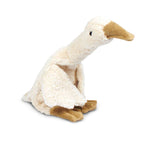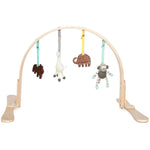When purchasing items for a nursery, many people select organic products to avoid pesticide residue that might remain on conventional items. There is no doubt that synthetic pesticides are very dangerous and children and expectant mothers are particularly susceptible, but on nursery items made with fabric, the pesticides are typically removed after one trip through the laundry. There are, however, two additional reasons to choose organic fabrics: our children’s environment and social justice.
Organic Fabrics
According to US law, for fabrics labeled “organic” the fiber (such as cotton) must be grown without synthetic pesticides, herbicides, or genetic engineering, on fields that haven’t been in conventional crop production for at least three years and fertilized without the use the use of chemicals, irradiation or sewage sludge. There are processing standards for organic fibers. The processes must not cause cancer, genetic damage, birth defects or endocrine disruption. Processing materials must also be biodegradable and meet strict toxicity levels.
According to the EPA there are over 3,000 high production volume chemicals (HPV’s) now in use in the US. Experts agree that there are six basic toxicity tests necessary to understand a chemical’s toxicity. Only 7% of the 3,000 HPV’s have undergone all six tests. In other words, just because a chemical, such a pesticide, is on the market doesn’t mean its toxicity has been thoroughly tested (Newman, 2003).
Sadly, cotton accounts for 10% of all the insecticides and 4.7% of all the pesticides used in the world although it is only 2.4% of the world’s crops. Cotton crops use more pesticides in the US than any other crop other than corn. A set of conventional cotton queen sheets uses over a pound of chemicals to grow, manufacture and finish. Products certified by the United States Department of Agriculture (USDA) or the Global Organic Textile Standard (GOTS) are the best guarantee we have that the items have been grown and produced organically.
Our Children’s Environment
Clean Water, Air and Soil 
One of the dangers of conventional farming is that persistent and toxic pesticides and herbicides can be accidentally spilled, be improperly disposed of, drift outside the spray area, leach into the soil and be carried into waterways. The good news is that organic practices, in addition to not contaminating our air and water, actually improve soil conditions. Organic practices, such as composting, cover cropping and crop rotation, increase the ability of the soil to retain water and increase crop yields.
Lower Carbon Footprint
Because organic processes prohibit the use of petroleum-based fertilizers, they contribute to a lower carbon footprint than conventional processes.
Increased Species Diversity
Studies have shown that organic farms support 34% more plant, animal and insect species that conventional farms. And they support 50% more pollinator species in particular. This diversity is likely a result of the fact that animals in conventional farm areas may be eating contaminated food sources, may relocate to find better food sources or may starve. Unfortunately, just a few granules of pesticide can kill birds and herbicides reduce habitat.
Social Justice
 In addition to caring about your child’s current and future environments, you might also care about the environment and welfare of other children. Conventional farming families and communities are at particular risk from harmful chemicals. Long term effects from pesticides include asthma, Parkinson’s disease, depression, anxiety, attention deficit and hyperactivity disorder, and cancer, including leukemia and Non-Hodgkin’s lymphoma.
In addition to caring about your child’s current and future environments, you might also care about the environment and welfare of other children. Conventional farming families and communities are at particular risk from harmful chemicals. Long term effects from pesticides include asthma, Parkinson’s disease, depression, anxiety, attention deficit and hyperactivity disorder, and cancer, including leukemia and Non-Hodgkin’s lymphoma.
Last, but certainly not least, child and forced labor is tragically used to grow cotton in 15 countries. The GOTS standard, in addition to certifying that the product is organic, also certifies that fair labor practices, such as no child or forced labor, are used.
In conclusion, the environment and social justice provide two very good reasons to purchase organic items for your nursery. Modern Nursery has lots of great certified organic products including swaddles, bedding, mattresses and decorative pillows!
“Happiness is peace of mind, all the rest ain’t worth a dime.” -Bankie Banx
 Barb Dornbush is an award-winning residential interior designer and owner of Campau Kitchen & Bath www.campaukb.com, a sustainable showroom in Grand Rapids, MI.
Barb Dornbush is an award-winning residential interior designer and owner of Campau Kitchen & Bath www.campaukb.com, a sustainable showroom in Grand Rapids, MI.
Reference
Newman, N. (2003). The Newman’s Own Organics Guide to a Good Life.


















